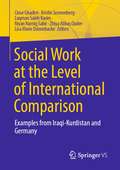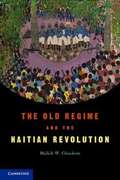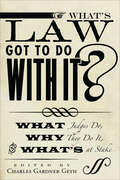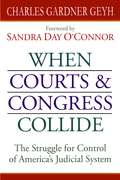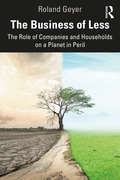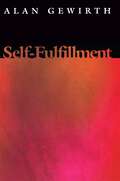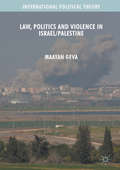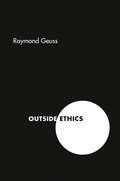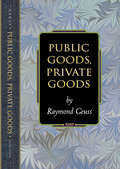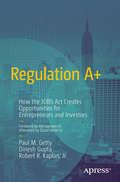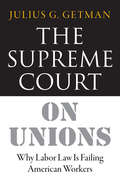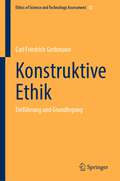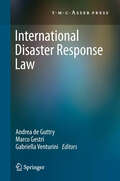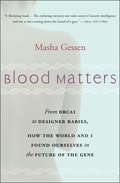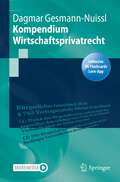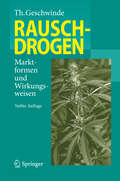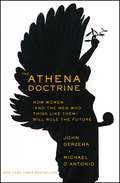- Table View
- List View
Social Work at the Level of International Comparison: Examples from Iraqi-Kurdistan and Germany
by Cinur Ghaderi Kristin Sonnenberg Luqman Saleh Karim Niyan Namiq Sabir Zhiya Abbas Qader Lisa Marie DünnebackeThe book presents a theoretical and practical approach to international social work. It uses examples from Germany with a long tradition of social work and focuses on the Kurdistan Region of Iraq, which is in a pioneering phase in teaching social work while at the same time experiencing a highly explosive situation in global politics. Socio-political challenges such as violence, traumatization, (religious) fundamentalism, ethnicization, changing gender relations, flight and migration call for a professional examination of social work as a human rights profession in international comparison.
The Old Regime and the Haitian Revolution
by Malick W. GhachemThe Haitian Revolution (1789-1804) was an epochal event that galvanized slaves and terrified planters throughout the Atlantic world. Rather than view this tumultuous period solely as a radical rupture with slavery, Malick W. Ghachem's innovative study shows that emancipation in Haiti was also a long-term product of its colonial legal history. The key to this interpretation lies in the Code Noir, the law that regulated master-slave relations in the French empire. The Code's rules for the freeing and punishment of slaves were at the center of intense eighteenth-century debates over the threats that masters, and not just freedmen and slaves, posed to the plantation order. Ghachem takes us deep into this volatile colonial past, digging beyond the letter of the law and vividly reenacting such episodes as the extraordinary prosecution of a master for torturing and killing his slaves. This book brings us face-to-face with the revolutionary invocation of Old Regime law by administrators seeking stability, but also by free people of color and slaves demanding citizenship and an end to brutality. The result is a subtle yet dramatic portrait of the strategic stakes of colonial governance in the land that would become Haiti.
What's Law Got To Do With It?: What Judges Do, Why They Do It, and What's at Stake (Stanford Studies in Law and Politics)
by Charles Gardner GeyhInWhat's Law Got to Do With It?, the nation's top legal scholars and political scientists examine to what extent the law actually shapes how judges behave and make decisions, and what it means for society at large. Although there is a growing consensus among legal scholars and political scientists, significant points of divergence remain. Contributors to this book explore ways to reach greater accord on the complexity and nuance of judicial decisionmaking and judicial elections, while acknowledging that agreement on what judges do is not likely to occur any time soon. As the first forum in which political scientists and legal scholars engage with one another on these hot button issues, this volume strives to establish a true interdisciplinary conversation. The inclusion of reactions from practicing judges puts into high relief the deep-seated and opposing beliefs about the roles of law and politics in judicial work.
When Courts and Congress Collide: The Struggle for Control of America's Judicial System
by Charles Gardner GeyhThe considerable independence from the US Congress that federal judges enjoy, says Geyh (law, Indiana U. -Bloomington), is attributable less to constitutional structure than to the emergence and entrenchment of institutional norms that shield the federal judiciary from congressional encroachment that could diminish the capacity of judges to follow the rule of law without fear or favor. He describes a dynamic equilibrium in the relationship between the two branches of government. Annotation ©2006 Book News, Inc. , Portland, OR (booknews. com)
The Business of Less: The Role of Companies and Households on a Planet in Peril
by Roland GeyerThe Business of Less rewrites the book on business and the environment. For the last thirty years, corporate sustainability was synonymous with the pursuit of ‘eco-efficiency’ and ‘win-win’ opportunities. The notion of ‘eco-efficiency’ gives us the illusion that we can achieve environmental sustainability without having to question the pursuit of never-ending economic growth. The ‘win-win’ paradigm is meant to assure us that companies can be protectors of the environment whilst also being profit maximizers. It is abundantly clear that the state of the natural environment has further degraded instead of improved. This book introduces a new paradigm designed to finally reconcile business and the environment. It is called ‘net green’, which means that in these times of ecological overshoot businesses need to reduce total environmental impact and not just improve the eco-efficiency of their products. The book also introduces and explains the four pollution prevention principles ‘again’, ‘different’, ‘less’, and ‘labor, not materials’. Together, ‘net green’ and the four pollution prevention principles provide a road map, for businesses and for every household, to a world in which human prosperity and a healthy environment are no longer at odds. The Business of Less is full of anecdotes and examples. This brings its material to life and makes the book not only very accessible, but also hugely applicable for everyone who is worried about the fate of our planet and is looking for answers.
Self-Fulfillment
by Alan GewirthCultures around the world have regarded self-fulfillment as the ultimate goal of human striving and as the fundamental test of the goodness of a human life. The ideal has also been criticized, however, as egotistical or as so value-neutral that it fails to distinguish between, for example, self-fulfilled sinners and self-fulfilled saints. Alan Gewirth presents here a systematic and highly original study of self-fulfillment that seeks to overcome these and other arguments and to justify the high place that the ideal has been accorded. He does so by developing an ethical theory that ultimately grounds the value of self-fulfillment in the idea of the dignity of human beings. Gewirth begins by distinguishing two models of self- fulfillment--aspiration-fulfillment and capacity-fulfillment--and shows how each of these contributes to the intrinsic value of human life. He then distinguishes between three types of morality--universalist, particularist, and personalist--and shows how each contributes to the values embodied in self-fulfillment. Building on these ideas, he develops a Odialectical' conception of reason that shows how human rights are central to self-fulfillment. Gewirth also argues that self-fulfillment has a social as well as an individual dimension: that the nature of society and the obstacles that disadvantaged groups face affect strongly the character of the self-fulfillment that persons can achieve. Bold in scope and rigorous in execution, Self-Fulfillment is a powerful new contribution to moral, social, and political philosophy.
Law, Politics and Violence in Israel/Palestine
by Maayan GevaThis book investigates the Israeli engagement with international law in relation to the Occupied Palestinian Territories (OPT) between 1967 and 2009. Grounded in a field-based study of the military International Law Department, it examines the dynamic position and impact that international law has had in the OPT. By analysing the Israeli 2008/9 offensive in Gaza as an example of contemporary warfare, the author argues that law and military agenda have become intertwined in 'lawfare', a condition sanctioning new forms of law and violence. The military legal system is central to the Israeli management of the OPT, yet despite the great interest in the legal aspects of the Israeli occupation, scholarly accounts of this institution are scarce. This discussion also has wider international relevance, particularly in the backdrop of the contemporary prominence of international law in Western militaries' operations. This book will appeal to researchers, practitioners and students interested in international relations, political theory, human rights, Middle Eastern politics, and legal studies.
Outside Ethics
by Raymond GeussOutside Ethics brings together some of the most important and provocative works by one of the most creative philosophers writing today. Seeking to expand the scope of contemporary moral and political philosophy, Raymond Geuss here presents essays bound by a shared skepticism about a particular way of thinking about what is important in human life--a way of thinking that, in his view, is characteristic of contemporary Western societies and isolates three broad categories of things as important: subjective individual preferences, knowledge, and restrictions on actions that affect other people (restrictions often construed as ahistorical laws). He sets these categories in a wider context and explores various human phenomena--including poetry, art, religion, and certain kinds of history and social criticism--that do not fit easily into these categories. As its title suggests, this book seeks a place outside conventional ethics. Following a brief introduction, Geuss sets out his main concerns with a focus on ethics and politics. He then expands these themes by discussing freedom, virtue, the good life, and happiness. Next he examines Theodor Adorno's views on the relation between suffering and knowledge, the nature of religion, and the role of history in giving us critical distances from existing identities. From here he moves to aesthetic concerns. The volume closes by looking at what it is for a human life to have "gaps"--to be incomplete, radically unsatisfactory, or a failure.
Philosophy and Real Politics
by Raymond GeussMany contemporary political thinkers are gripped by the belief that their task is to develop an ideal theory of rights or justice for guiding and judging political actions. But in Philosophy and Real Politics, Raymond Geuss argues that philosophers should first try to understand why real political actors behave as they actually do. Far from being applied ethics, politics is a skill that allows people to survive and pursue their goals. To understand politics is to understand the powers, motives, and concepts that people have and that shape how they deal with the problems they face in their particular historical situations. Philosophy and Real Politics both outlines a historically oriented, realistic political philosophy and criticizes liberal political philosophies based on abstract conceptions of rights and justice. The book is a trenchant critique of established ways of thought and a provocative call for change.
Public Goods, Private Goods (Princeton Monographs in Philosophy #11)
by Raymond GeussMuch political thinking today, particularly that influenced by liberalism, assumes a clear distinction between the public and the private, and holds that the correct understanding of this should weigh heavily in our attitude to human goods. It is, for instance, widely held that the state may address human action in the ''public'' realm but not in the ''private.'' In Public Goods, Private Goods Raymond Geuss exposes the profound flaws of such thinking and calls for a more nuanced approach. Drawing on a series of colorful examples from the ancient world, he illustrates some of the many ways in which actions can in fact be understood as public or private. The first chapter discusses Diogenes the Cynic, who flouted conventions about what should be public and what should be private by, among other things, masturbating in the Athenian marketplace. Next comes an analysis of Julius Caesar's decision to defy the Senate by crossing the Rubicon with his army; in doing so, Caesar asserted his dignity as a private person while acting in a public capacity. The third chapter considers St. Augustine's retreat from public life to contemplate his own, private spiritual condition. In the fourth, Geuss goes on to examine recent liberal views, questioning, in particular, common assumptions about the importance of public dialogue and the purportedly unlimited possibilities humans have for reaching consensus. He suggests that the liberal concern to maintain and protect, even at a very high cost, an inviolable ''private sphere'' for each individual is confused. Geuss concludes that a view of politics and morality derived from Hobbes and Nietzsche is a more realistic and enlightening way than modern liberalism to think about human goods. Ultimately, he cautions, a simplistic understanding of privacy leads to simplistic ideas about what the state is and is not justified in doing.
Who Needs a World View?
by Raymond GeussOne of the world’s most provocative philosophers attacks the obsession with comprehensive intellectual systems—the perceived need for a world view. We live in a unitary cosmos created and cared for in all its details by a benevolent god. That, for centuries, was the starting point for much philosophical and religious thinking in the West. The task was to accommodate ourselves to that view and restrict ourselves to working out how the pieces fit together within a rigidly determined framework. In this collection of essays, one of our most creative contemporary philosophers explores the problems and pathologies of the habit of overly systematic thinking that we have inherited from this past. Raymond Geuss begins by making a general case for flexible and skeptical thinking with room for doubt and unresolved complexity. He examines the ideas of two of his most influential teachers—one systematic, the other pragmatic—in light of Nietzsche’s ideas about appearance and reality. The chapters that follow concern related moral, psychological, and philosophical subjects. These include the idea that one should make one’s life a work of art, the importance of games, the concept of need, and the nature of manifestoes. Along the way, Geuss ranges widely, from ancient philosophy to modern art, with his characteristic combination of clarity, acuity, and wit. Who Needs a World View? is a provocative and enlightening demonstration of what philosophy can achieve when it abandons its ambitions for completeness, consistency, and unity.
A World without Why
by Raymond GeussWhy the human and natural world is not as intelligible to us as we think it isWishful thinking is a deeply ingrained human trait that has had a long-term distorting effect on ethical thinking. Many influential ethical views depend on the optimistic assumption that, despite appearances to the contrary, the human and natural world in which we live could, eventually, be made to make sense to us. In A World without Why, Raymond Geuss challenges this assumption.The essays in this collection—several of which are published here for the first time—explore the genesis and historical development of this optimistic configuration in ethical thought and the ways in which it has shown itself to be unfounded and misguided. Discussions of Greco-Roman antiquity and of the philosophies of Socrates, Plato, Hegel, Marx, Nietzsche, and Adorno play a central role in many of these essays. Geuss also ranges over such topics as the concepts of intelligibility, authority, democracy, and criticism; the role of lying in politics; architecture; the place of theology in ethics; tragedy and comedy; and the struggle between realism and our search for meaning.Characterized by Geuss's wide-ranging interests in literature, philosophy, and history, and by his political commitment and trenchant style, A World without Why raises fundamental questions about the viability not just of specific ethical concepts and theses, but of our most basic assumptions about what ethics could and must be.
Regulation A+
by Paul M. Getty Dinesh Gupta Robert R. Kaplan"This book is a must-read for all entrepreneurs who need to raise capital to grow their businesses. " --from the Foreword by Bill Hambrecht, Founder and Chairman, WR Hambrecht + Co "We congratulate the authors for bringing together many of the elements needed to help corporations and their investors take advantage of Reg A+ in a simple and easy-to-understand guide. " --from the Afterword by David Weild IV, Founder and CEO, Weild & Co. ; Former Vice Chairman of NASDAQ; "Father" of the JOBS Act Discover how to raise money under the SEC''s long-awaited Regulation A+ implementing Title IV of the JOBS Act. This ground-breaking book is the authoritative guide to Reg A+ for executives of emerging growth companies, entrepreneurs, financial advisers, venture capitalists, investment bankers, securities lawyers, and finance and MBA students on how to raise up to $50 million a year through what is in effect a new type of IPO unencumbered by the heavy regulation and cost of a traditional IPO. Reg A+ lifts many of the constraints on soliciting funds, raising growth capital through public offerings, and trading new stock issues that till now inhibited the growth of small companies. The SEC rules implementing Title III of the JOBS Act by expanding equity crowdfunding to non-accredited investors and allowing small businesses to raise up to $1 million per year have been greeted with speculative excitement in the startup space. But investment banking and stock market heavy hitters such as Bill Hambrecht and David Weild believe that Reg A+ will have a much greater economic impact than the crowdfunding rules and will launch a revolutionary period of growth, innovation, investment returns, and job creation. Paul Getty, Dinesh Gupta, and Robert Kaplan pool their experience as serial entrepreneurs, investors, and lawyers to show readers in very practical terms how to take maximum advantage of the powerful provisions of the Reg A+ that permit companies to raise up to $50 million--a tenfold increase over the old Reg A limit of $5 million and fifty times the crowdfunding limit allow companies to market IPOs to more people than just accredited investors make it easier to get the word out on offerings exempt companies under certain conditions from onerous and costly reporting and compliance requirements, such as Sarbanes-Oxley What you''ll learn How Title IV of the JOBS Act amends Regulation A, making it easier for you to raise up to $50 million in expansion capital while avoiding burdensome regulations. How raising funds through Regulation A might now be a better and less costly choice for raising capital than current options (like loans or venture capital). How to use Regulation A to gain liquidity for your business, your employees, and your investors--while maintaining control. How to abide by Regulation A rules before, during, and after an IPO. What kinds of businesses can take part in Regulation A offerings. How and where to trade shares after the IPO. Who this book is for Executives of emerging growth companies, entrepreneurs, financial advisers, venture capitalists, investment bankers, securities lawyers, finance and MBA students, and others. Table of Contents Chapter 1 Introduction Chapter 2 Overcoming Challenges to Going Public Chapter 3 Benefits of Regulation A+ Chapter 4 Limitations and Business Line Considerations Chapter 5 The Key Elements of a Reg A+ Offering Chapter 6 Raising the Capital through an Underwriter Chapter 7 Post-IPO Activities Chapter 8 Secondary Markets and Regulation A+ Securities Chapter 9 Final Thoughts Appendix A Current Legal Authority Appendix B Current Guidance from SEC Appendix C Public Statements of Commissioners at Open Meeting to Adopt Regulation A+ Appendix D OTC QX/OTC QB Listing Requirements and On-Ramp Guides Appendix E Offering Statement Exemplars Appendix F: Blue Sky Glossary
Taking On Big Pharma: Dr. Charles Bennett's Battle (Children’s Health Defense)
by Julius Getman Terri LeClercqThe battle between Big Pharma and scientific integrity Larger-than-life, creative, and fiercely ambitious, Dr. Charlie Bennett has a long history of revealing dangerous side effects of bestselling medicines. In 2006, his meta-analysis of existing data showed that top-selling ESAs (erythropoietin stimulating agents) created previously unrecognized risks, deaths, and serious illness. According to Dr. Steven Rosen, chief medical officer of the City of Hope Cancer treatment center, Bennett &“saved more lives than anyone in American medicine.&” Bennett&’s work also created enemies: Bennett was accused, on the basis of flimsy evidence, of mishandling government grant money and violating the False Claims Act. Powerful interests within Big Pharma, academia, and law enforcement joined in the attack on Bennett. By 2010, he was forced from his academic position; was besieged by lawsuits; and became the victim of a coordinated, well-funded campaign to discredit him and refute his work. From pharma superstar to disgrace and disrepute in the blink of an eye. Taking On Big Pharma explores Bennett&’s achievement and evaluates the charges against him. Exposed is the unsettling relationship between the pharmaceutical industry and academia. The result of more than five years of research and hundreds of hours of interviews with scientists, academicians, and federal prosecutors, this is an unflinching look at how institutions, purportedly devoted to public health and education, can be corrupted for profit—from drug sales or research grants.
The Supreme Court on Unions: Why Labor Law Is Failing American Workers
by Julius G. GetmanLabor unions and courts have rarely been allies. From their earliest efforts to organize, unions have been confronted with hostile judges and antiunion doctrines. In this book, Julius G. Getman argues that while the role of the Supreme Court has become more central in shaping labor law, its opinions betray a profound ignorance of labor relations along with a persisting bias against unions. In The Supreme Court on Unions, Getman critically examines the decisions of the nation's highest court in those areas that are crucial to unions and the workers they represent: organizing, bargaining, strikes, and dispute resolution. As he discusses Supreme Court decisions dealing with unions and labor in a variety of different areas, Getman offers an interesting historical perspective to illuminate the ways in which the Court has been an influence in the failures of the labor movement. During more than sixty years that have seen the Supreme Court take a dominant role, both unions and the institution of collective bargaining have been substantially weakened. While it is difficult to measure the extent of the Court’s responsibility for the current weak state of organized labor and many other factors have, of course, contributed, it seems clear to Getman that the Supreme Court has played an important role in transforming the law and defeating policies that support the labor movement.
Künstliche Intelligenz in der Forschung: Neue Möglichkeiten und Herausforderungen für die Wissenschaft (Ethics of Science and Technology Assessment #48)
by Carl Friedrich Gethmann Peter Buxmann Julia Distelrath Bernhard G. Humm Stephan Lingner Verena Nitsch Jan C. Schmidt Indra Spiecker genannt DöhmannDieses Buch ist eine Open Access Publikation.Der lange gehegte Traum von künstlicher Intelligenz (KI) wird in unserer Alltagswelt zunehmend Realität. Damit verbinden sich hohe gesellschaftliche Erwartungen, aber auch Sorgen hinsichtlich einer schleichenden Entmündigung des Menschen. Am Beispiel des Forschungssektors lotet dieser Band die Optionen, Entwicklungschancen und Risiken von KI-Techniken für die Zukunft des wissenschaftlichen Erkenntnisprozesses und der darauf beruhenden technischen Entwicklungen aus. Zu diesem Zweck wird zunächst der Stand der KI-Technik und ihrer Anwendungen dargestellt. Es folgen wissenschaftsphilosophische Untersuchungen zur Frage der Ersetzbarkeit des forschenden Menschen durch KI und zu erwartenden Veränderungen in der wissenschaftlichen Forschung. Weitere Abschnitte widmen sich den Folgen für die Arbeitswelt von Forschern/Forscherinnen sowie den durch KI erzeugten neuen Herausforderungen für die rechtliche Regulierung im Spannungsfeld von Wissenschaftsfreiheit und Datenschutz. Der Band schließt mit Empfehlungen für die verantwortlichen Akteure in Wissenschaft, Forschungspolitik und Gesellschaft aus interdisziplinärer Perspektive.
Konstruktive Ethik: Einführung und Grundlegung (Ethics of Science and Technology Assessment #52)
by Carl Friedrich GethmannDas Buch bietet einen systematischen Gesamtentwurf der Allgemeinen Ethik und damit für den interessierten Leser einen Zugang zu den wichtigsten Fragestellungen der Disziplin Ethik. Dazu werden im Anschluß an eine systematische und historische Einleitung propädeutische Fragen behandelt und die bekannten drei Paradigmen ethischer Reflexion (Tugendethik, Nutzenethik und Verpflichtungsethik) in Orientierung an den klassischen Texten dargestellt. Darauf aufbauend wird die mögliche Komplementarität dieser Paradigmen im Sinne eines Filtermodells sukzessiver ethischer Urteilsbildung entwickelt. Das Buch zeigt, ausgehend von den sprachphilosophischen und wissenschaftsphilosophischen Arbeiten der Erlanger Schule, darüber hinaus, daß moralische Verpflichtungen und Berechtigungen mit ihren unterschiedlichen Graden von Verbindlichkeit ohne starke „realistische“ und wertphilosophische Unterstellungen rekonstruiert werden können.
International Disaster Response Law
by Marco Gestri Gabriella Venturini Andrea De GuttryWith a Foreword by Kristalina Georgieva, European Commissioner for International Cooperation, Humanitarian Aid and Crisis Response Over the last decades natural and man-made disasters have been increasing in terms of frequency, size, number of people affected and material damage caused. There is growing awareness of the importance of adequate national and international legal frameworks for disaster prevention, mitigation and response. The implementation of these frameworks, however, poses serious challenges.This book analyses International Disaster Response Law as developed in recent times and identifies the main existing normative gaps. The authors address the rights and duties of States in preventing and mitigating disasters, in facilitating access to their territory for humanitarian relief actors, as well as issues related to liability and compensation. Due attention is paid to European Union law governing disaster response (and to its reform in the light of the Lisbon Treaty) and to the main trends in domestic legislation. Human rights obligations are thoroughly examined and the potential relevance of international criminal law is assessed. Additional topics such as the status of relief personnel, the hindrances to the delivery of relief consignments by customs and excise administration, the use of civilian and military defence assets in emergency situations, the mechanisms and procedures available to offer financial support for recovery and rehabilitation, risk insurance, and the issue of corruption during disaster-related activities are specifically addressed.By drawing on the expertise of lawyers, political scientists, economists and humanitarian practitioners, the book promotes much-needed interdisciplinary dialog and sheds light on a largely uncharted field of research. It is therefore essential reading for academics and practitioners in international and EU law, policy makers, civil protection and humanitarian operators and for anyone interested in exploring the legal facets of the international community's response to large-scale calamitous events. Over the last decades natural and man-made disasters have been increasing in terms of frequency, size, number of people affected and material damage caused. There is growing awareness of the importance of adequate national and international legal frameworks for disaster prevention, mitigation and response. The implementation of these frameworks, however, poses serious challenges.This book analyses International Disaster Response Law as developed in recent times and identifies the main existing normative gaps. The authors address the rights and duties of States in preventing and mitigating disasters, in facilitating access to their territory for humanitarian relief actors, as well as issues related to liability and compensation. Due attention is paid to European Union law governing disaster response (and to its reform in the light of the Lisbon Treaty) and to the main trends in domestic legislation. Human rights obligations are thoroughly examined and the potential relevance of international criminal law is assessed. Additional topics such as the status of relief personnel, the hindrances to the delivery of relief consignments by customs and excise administration, the use of civilian and military defence assets in emergency situations, the mechanisms and procedures available to offer financial support for recovery and rehabilitation, risk insurance, and the issue of corruption during disaster-related activities are specifically addressed.By drawing on the expertise of lawyers, political scientists, economists and humanitarian practitioners, the book promotes much-needed interdisciplinary dialog and sheds light on a largely uncharted field of research. It is therefore essential reading for academics and practitioners in international and EU law, policy makers, civil protection and humanitarian operators and for anyone interested in exploring the legal facets of the international community's response to large-scale calamitous events.
Blood Matters: From BRCA1 to Designer Babies, How the World and I Found Ourselves in the Future of the Gene
by Masha GessenA National Book Award winner&’s personal journey through the ethical dilemmas and unsettling choices raised by the new frontier of DNA testing. Several years after Masha Gessen&’s mother died of breast cancer, she discovered she too had the BRCA1 gene mutation, which predisposes women to high rates of ovarian and breast cancer. Her doctors gave her narrow options: surgical removal of her breasts and ovaries or living with the likelihood of one day developing cancer. As Gessen wrestled with her own health decisions, she sought more information about the implications of genetic testing from a variety of sources—ranging from others faced with her same dilemma to medical researchers, historians, and religious thinkers. With concerns both practical and philosophical, personal and societal, her inquiry led her across the globe, with stops in Israel, Russia, Austria, and the United States. Weaving her own story into her journalistic research, Gessen offers insight into how knowledge that was once unimaginable now shapes our lives. Blood Matters explores not only the decisions we must make in our physical and emotional health, but also the ethical choices we face when choosing spouses or having children. &“Valuable reading to almost anyone facing a huge health decision, not only for the literary commiseration it offers, but also for the inspired example of medical sleuthing on one&’s own behalf that it provides. Gessen keeps an inflammatory topic at room temperature, writing elegantly and without self pity.&” —The New York Times Book Review
Kompendium Wirtschaftsprivatrecht (Springer-Lehrbuch)
by Dagmar Gesmann-NuisslDieses Buch vermittelt die Grundlagen des Wirtschaftsprivatrechts klar strukturiert, kompakt, praxisbezogen und fallorientiert. Es richtet sich in erster Linie an Studierende der Wirtschaftswissenschaften und Studierende, die Recht im Nebenfach belegen, unterstützt aber auch angehende Juristen optimal bei der Klausur- und Prüfungsvorbereitung. Neben Abbildungen, die den Lernstoff visualisieren, finden sich darin zahlreiche Aufgaben zur Selbstkontrolle. Beispielsfälle mit Lösungshinweisen sowie die begleitend angebotene SN Flashcards Lern App erhöhen den Lernerfolg zusätzlich.
Rauschdrogen
by Thomas GeschwindeDas Werk bietet grundlegende Informationen zu den Wirkungsweisen verschiedener Drogen. Die ausführliche Darstellung in Form eines Nachschlagewerks ermöglicht den Vergleich der jeweiligen Wirkungen. Neben "klassischen" Drogen wie Kokain werden in der Neuauflage auch vollsynthetische, ursprünglich für medizinische Therapien entwickelte Substanzen ausführlich behandelt. Ferner werden pflanzliche Stoffe, die über Online-Shops erhältlich sind, und "Lifestyle-Medikamente", die u. a. zur kognitiven Leistungssteigerung eingenommen werden, berücksichtigt.
Rauschdrogen: Marktformen Und Wirkungsweisen
by Thomas GeschwindeDas Werk bietet grundlegende Informationen zu den Wirkungsweisen verschiedener Drogen. Die ausführliche Darstellung in Form eines Nachschlagewerks ermöglicht den Vergleich der jeweiligen Wirkungen. Neben „klassischen“ Drogen wie Kokain werden in der Neuauflage auch vollsynthetische, ursprünglich für medizinische Therapien entwickelte Substanzen ausführlich behandelt. Ferner werden pflanzliche Stoffe, die über Online-Shops erhältlich sind, und „Lifestyle-Medikamente“, die u. a. zur kognitiven Leistungssteigerung eingenommen werden, berücksichtigt.
Darf ich das oder muss ich sogar?: Die Philosophie des richtigen Handelns
by Bernward GesangOb es um Weltarmut oder um Genfood geht, ob um die Erderwärmung oder die Menschenrechte, ob um Flüchtlingspolitik oder die Verteilung medizinischer Güter, - immer stoßen wir auf drängende Fragen der Moral und ihrer Entscheidung. Dieses Buch bietet keine Patentrezepte für richtiges Handeln, führt aber in alle wichtigen Begriffe und Grundlagen ethischen Denkens und in die Werkzeuge zur Entscheidungsfindung ein. Auf der Basis einer praktisch orientierten utilitaristischen Interessensethik findet der Autor originelle Antworten auf viele wichtige Fragen der Gegenwart.
The Athena Doctrine: How Women (and the Men who Think Like Them) will Rule the Future
by John Gerzema Michael D’antonioBrought to life through real world examples and backed by rigorous data, The Athena Doctrine shows how feminine traits are ascending--and bringing success to people and organizations around the world.
The European Company
by Dirk Van Gerven Paul StormThe European company ('SE') is a legal entity offering a European perspective for businesses, which became a reality on 8 October 2004. Its purpose is to allow businesses that wish to extend their activities beyond their home Member State to operate throughout the EU on the basis of a single set of rules and a unified management system. This book explains how to set up and organise a European company, and sets out the text of the relevant EC instruments that serve as its legal basis, as well as the national implementing legislation. It is essential for businesses and their advisers to understand the implementing legislation of the relevant Member States in deciding where to establish an SE. This book provides comprehensive coverage of such legislation in all Member States of the European Economic Area which have, as at 1 July 2005, implemented the Regulation containing the SE statute and the Directive on employee involvement in the SE.
